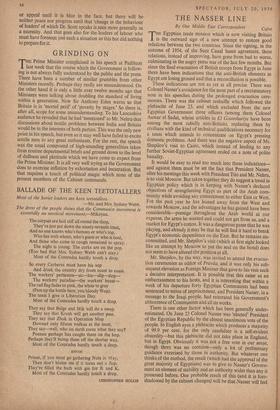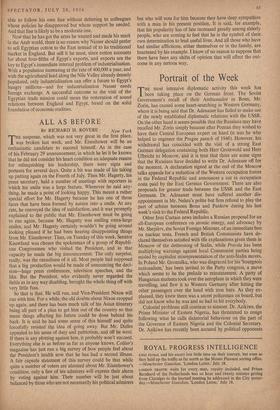By Our Middle East Correspondent Cairo
THE Egyptian trade mission which is now visiting Britain is the outward sign of a new attempt to restore good relations between the two countries. Since the signing, in the autumn of 1954, of the Suez Canal bases agreement, these relations, instead of improving, have gone from bad to worse, culminating in the angry press war of the last few months. But since the final evacuation of British troops from Egypt in June there have been indications that the anti-British elements in Egypt are losing ground and that a reconciliation is possible. These indications are not as yet at all precise. There Was Colonel Nasser's avoidance for the most part of a recriminatory note in his speeches. during the prolonged evacuation cere- monies. There was the cabinet reshuffle which followed the plebiscite of June 23, and which excluded from the new Egyptian Government three officers (among them Colonel Anwar el Sadat, whdse articles in El Gounthuriye have been among the most rabidly anti-British), replacing them by civilians with the kind of technical qualifications necessary for a team which intends to concentrate on Egypt's pressing domestic problems. And there was the negative aspect of Mr. Shepilov's visit to Cairo, which instead of leading to any further Soviet-Egyptian agreement ended on a note of polite banality.
It would be easy to read too much into these indications— and against them must be set the fact that President Nasser, after his meetings this week with President Tito and Mr. Nehru, is to visit Moscow. But taken together they do suggest a trend in Egyptian policy which is in keeping with Nasser's declared objectives of strengthening Egypt as part of the Arab com- munity while avoiding any commitment to either East or West. For the past year he has leaned away from the West and towards Moscow, and the advantages he has gained have been considerable—prestige throughout the Arab world at our expense, the arms he wanted and could not get from us, and a market for Egypt's cotton. It was a dangerous game that he was playing, and already it may be that he will find it hard to break Egypt's economic dependence on the East. But he remains un- committed, and Mr. Shepilov's visit (which at first sight looked like an attempt by Moscow to put the seal on the bond) does not seem to have altered the position at all.
Mr. Shepilov, by the way, was invited to attend the evacua- tion ceremonies as editor of Pravda, and it was only his sub- sequent elevation as Foreign Minister that gave to his visit such a decisive interpretation. It is possible that this came as an embarrassment to his hosts, and it is interesting that within a week of his departure forty Egyptian Communists had been sentenced to terms of imprisonment, and President Nasser, in a message to the Iraqi people, had reiterated his Government's abhorrence of Communism and all its works.
There is one other factor which has been generally under- estimated. On June 23 Colonel Nasser was `elected' President of the Egyptian Republic by the almost unanimous vote of the people. In English eyes a plebiscite which produces a majority of 99.9 per cent. for the only candidate is a self-evident absurdity—but this plebiscite did not take place in England, but in Egypt. Obviously it was not a free vote in our sene, though there was no coercion—only a lot of preliminary guidance exercised by those in authority. But whatever one thinks, of the method, the result (which had the approval of the great majority of Egyptians) was to give to Nasser's Govern- ment an element of stability and an authority wider than any it possessed before. One probable result of this (and it is fore- shadowed by the cabinet changes) will be that Nasser will feel Now that he has got the arms he wanted and made his mark in the Arab world, there is no reason why Nasser should prefer to sell Egyptian cotton to the East instead of to its traditional market in England. But sell it he must, since cotton accounts for about four-fifths of Egypt's exports, and exports are the key to Egypt's immediate internal problem of industrialisation. With a population increasing at thel`rate of 400,000 a year, and with the agricultural land along the Nile Valley already densely populated, only industrialisation can offer a future to Egypt's hungry millions—and for industrialisation Nasser 'needs foreign exchange. A successful outcome to the visit of the Egyptian trade mission could mean the restoration of sound relations between England and Egypt, based on the solid foundation of economic realities.



















































 Previous page
Previous page